#Justice4Moldova: Debates on the current state of justice sector reform
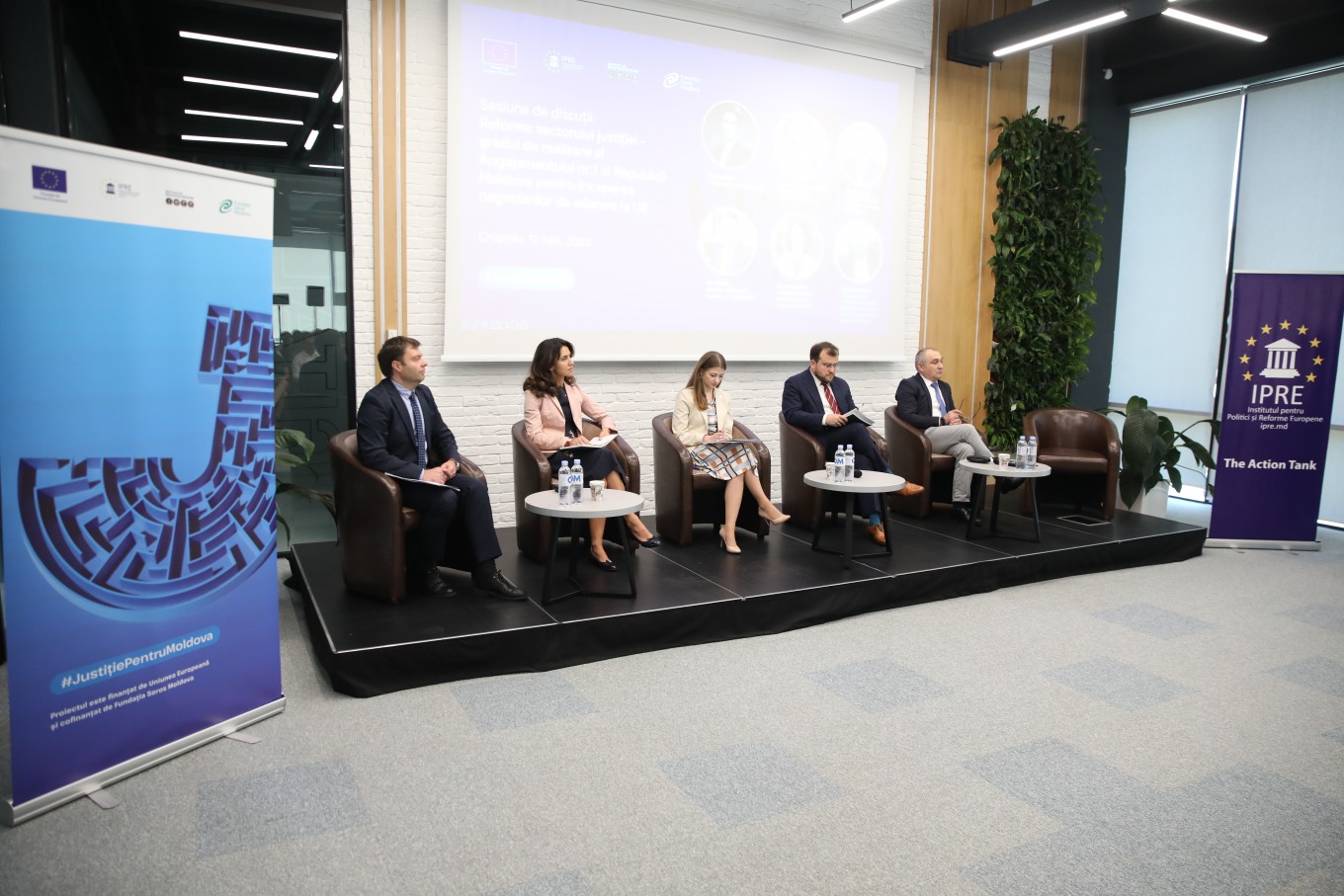
The Institute for European Policies and Reforms (IPRE), in partnership with the Institute for War and Peace Reporting (IWPR), launched yesterday, July 12, 2023, during a public event, the project “Ensuring the integrity, efficiency and independence of the justice system in Moldova – #Justice4Moldova”, funded by the European Union and co-financed by Soros Foundation Moldova.
During the final session, Mariana Rața TV8 journalist, moderated a discussion with key national stakeholders on the state of play of priority reform actions in the justice sector, in line with key steps proposed by the European Commission in its June 2022 opinion on Moldova’s application for EU membership. Speakers assessed the results achieved so far, key challenges and future priorities for the justice sector. The main interventions of the speakers can be found below:
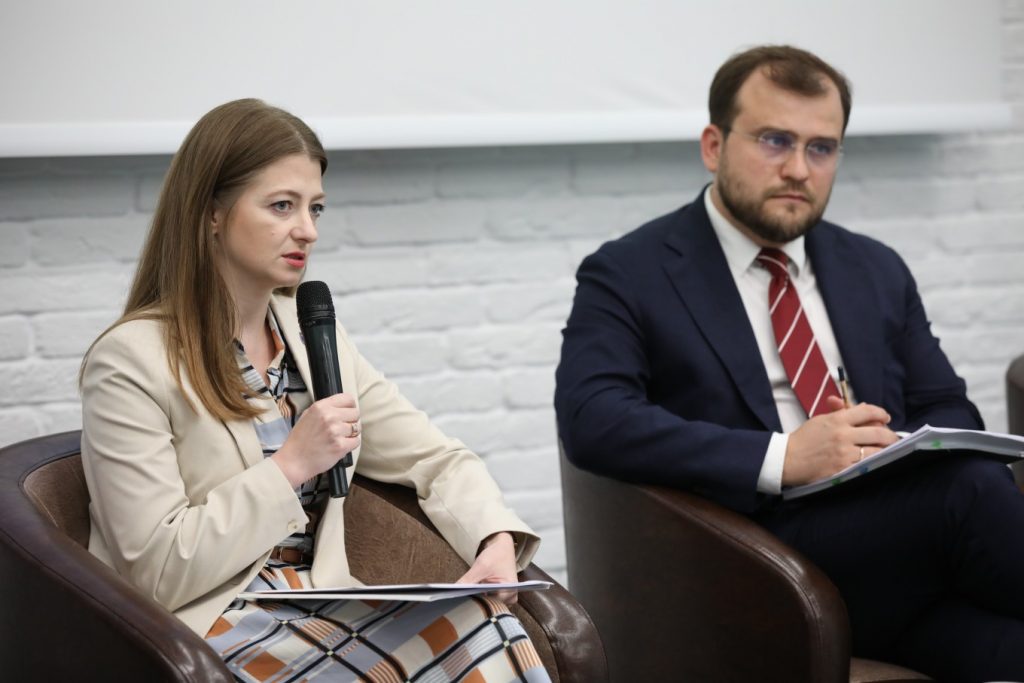
Veronica Mihailov-Moraru, Minister of Justice: “Implementing justice reform and fighting corruption is one of the biggest challenges, but it is also the key element for our European integration path. Last but not least, it is an indispensable element for strengthening the rule of law in Moldova, with functioning institutions. According to the Action Plan of the National Commission for European Integration, the Ministry of Justice is responsible for 19 actions, which are covering 6 of the 9 conditionalities formulated by the European Commission. The legislative initiatives promoted in this regard aimed at: amending the normative framework to the new constitutional provisions in the judiciary area; strengthening mechanisms on the disciplinary liability of judges and evaluation and selection colleges; carrying out the extraordinary evaluation exercise of candidates for membership in the Superior Council of Magistracy (SCM) and the Superior Council of Prosecutors (SCP) and their colleges; delimitation of competences between the National Anticorruption Centre and the Anticorruption Prosecutor’s Office; conducting criminal process “in absentia”; the new law on access to information; strengthening the legislative framework on the activity of the Ombudsman institution and the Equality Council, etc. Recently, the European Commissioner for Enlargement and Neighbourhood mentioned that Moldova has completed 3 of the 9 steps, especially measure 2, 8 and 9, in which the Ministry of Justice was involved. So, I want to conclude that the authorities are making every effort to effectively carry out all these measures in a very short time, but at the same time it is a challenge not to let urgency affect the qualitative process of fulfilling the measures and applying them in practice in the long run. Only in this way will we be able to achieve a genuine justice reform.”
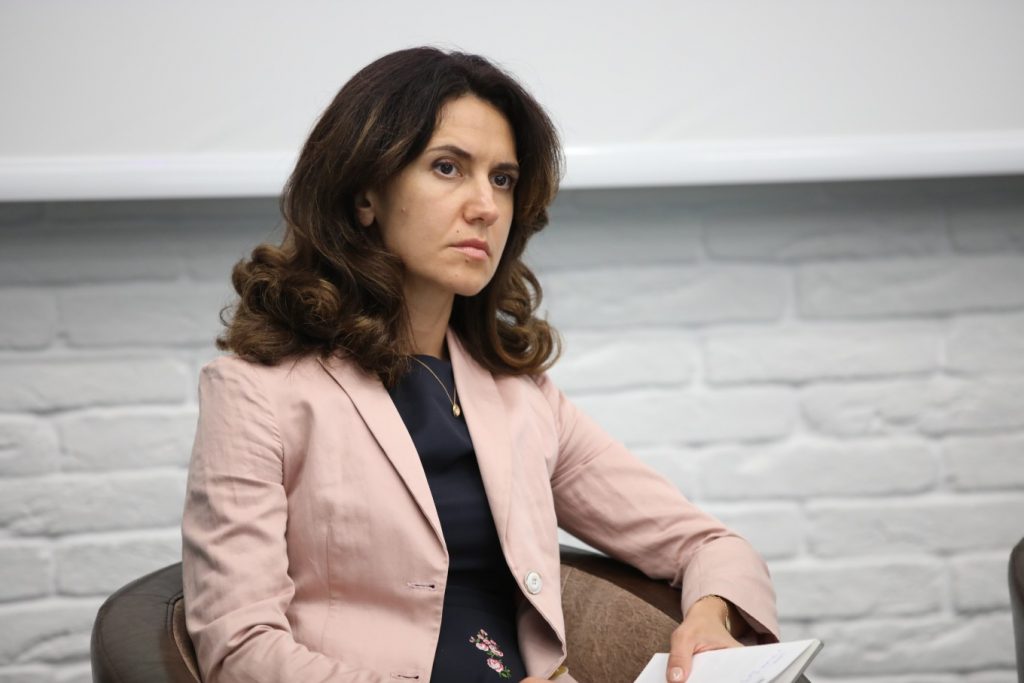
Olesea Stamate, Chair of the Legal Commission, Appointments and Immunities, Parliament of the Republic of Moldova: “Certainly, we all benefit from the active participation of civil society in the process of developing and evaluating public policies. In the Parliament, we have a good experience in this area, such as involving civil society in public consultations and debates, but also drafting laws. If we are to talk about where we are today, I would like to point out a few aspects. Vetting and pre-vetting are fundamental elements of the justice reform, because without honest and professional human resources in the system it makes no sense to change other laws, because they will not be applied in good faith. Here we have more results, but in the next period, in addition to the actions and laws already approved, we have the following priorities: First, it is necessary to strengthen the capacities of the SCM and SCP, but also of the colleges, so that these bodies can fully take over the evaluation function of judges and prosecutors in the system. Second, the initial and continuous training component of judges and prosecutors is extremely important, and entry to the National Institute of Justice is strictly on merit and its graduation is based on knowledge. Third, but not the last: it is about strengthening the institutions that have the role of fighting and investigating corruption, which are NAC and APO, so that they have all the necessary tools to investigate and fight corruption effectively, especially the large scale and systemic one.”
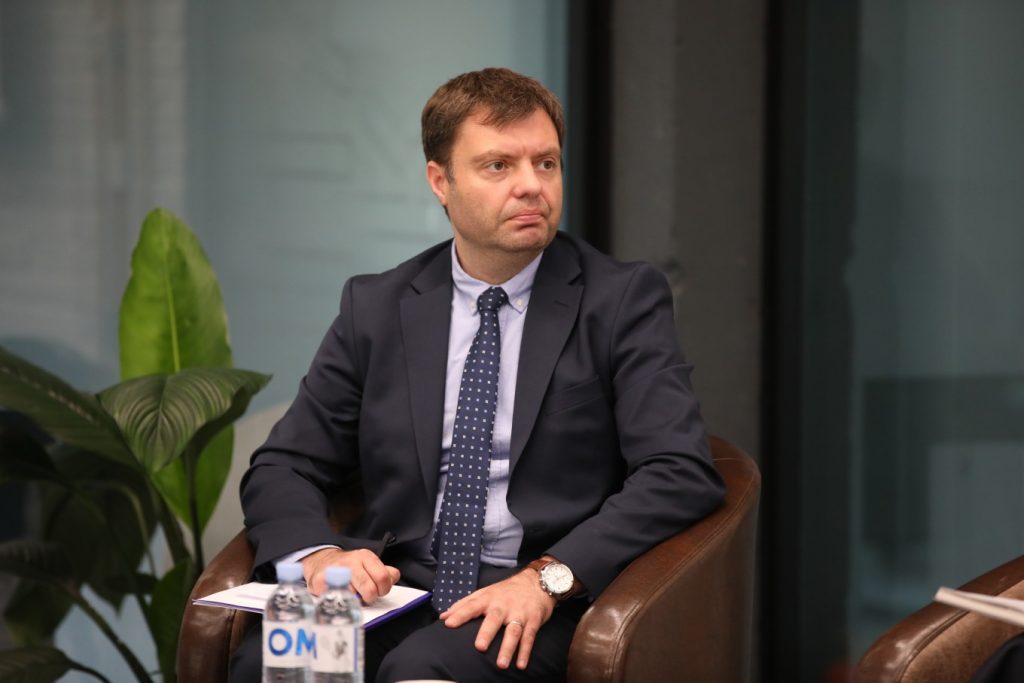
Ion Guzun, Member of the Superior Council of Magistracy: “The most important challenge is that we have to respond to real issues in the judiciary. Here I want to mention the large workload of judges, but also the leave of 80% of judges from the Supreme Court of Justice, which was a blockage for the institution. Thanks to the changes that were made in the legislation, it was a first step to detach 7 judges to examine the most urgent cases. At the same time, I want to point out that those judges continue to examine the cases in their courts to which they have been seconded, and we understand that such temporary changes will trigger a greater volume of work and a delay in the examination of cases. That is why I use the opportunity to ask prosecutors, the parties involved in the trial, to be more vigilant and to contribute to a more effective examination of files. I hope very much that with this project, presented today, but also with the effort of the SCM on other occasions, we will be able to communicate and explain to judges what are the effects of these changes. At the same time, I very much hope that these changes will cause more people with a lack of integrity to leave the system. Only in this way will we achieve the expected results.”
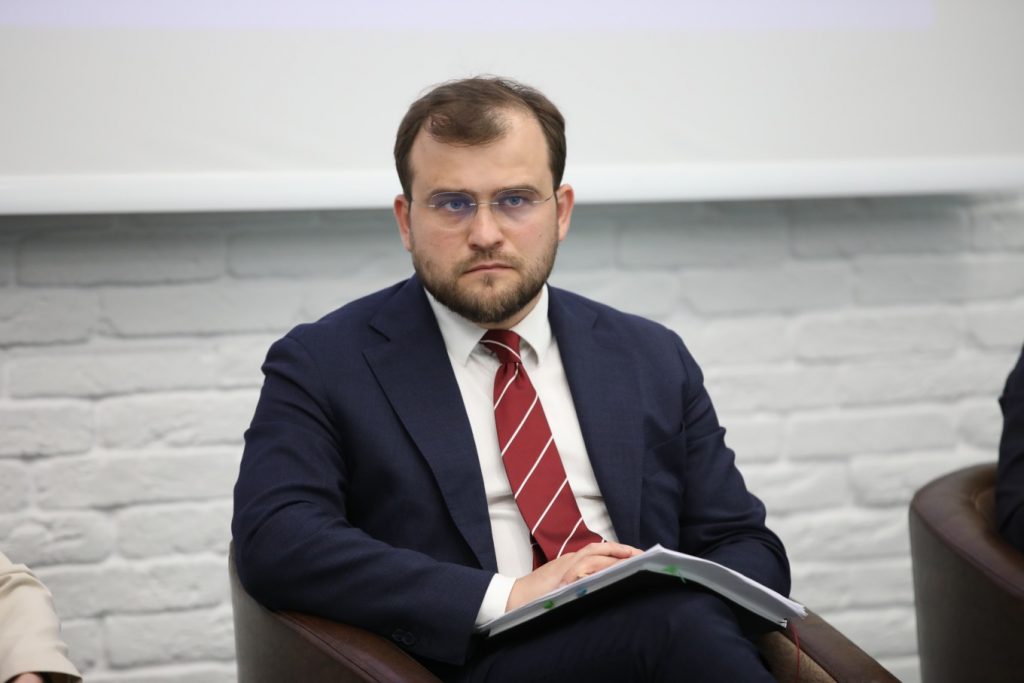
Ilie Chirtoaca, President of the Legal Resources Centre from Moldova: “LRCM launched today the results of a study and the first thing we notice in this exercise is that certain myths or opinions about the reluctance in the system, about the assumed reforms are debunked. An example would be the opinion of those in the system regarding vetting, where data shows that a large majority, i.e. over 60% of judges and prosecutors, accept this exercise. Thus, the role of our organization, but also of our colleagues from IPRE, is to produce this kind of data, information, so that the decision-makers can make certain decisions. So, we still see our role as an actor who identifies several options and can, together with the authorities, propose them, so that the best solution is taken. Justice reform is like a red thread in the 9 commitments. There is another effort we made together with IPRE and Expert-Grup to monitor certain conditionalities. Thus, I want to mention that most of the proposals, actions and sub-actions have been carried out. Our alternative assessment speaks of a grade of 4 out of 5, and even if there are still some arrears, the overall picture is positive.”
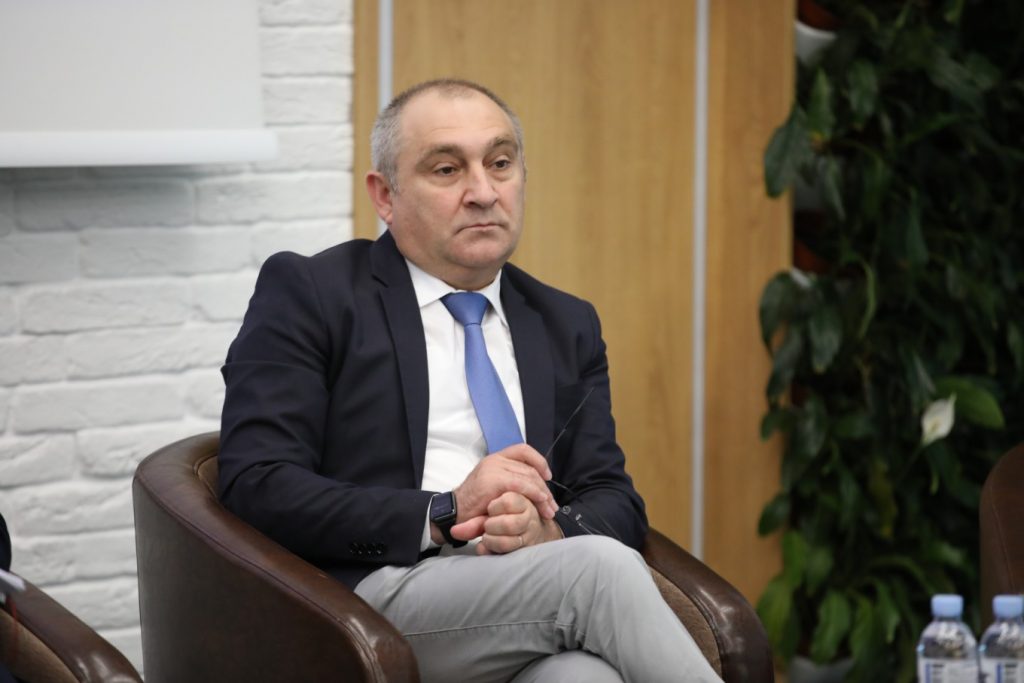
Victor Munteanu, Adviser to the Prime Minister in the field of justice and anticorruption, Office of the Prime Minister of the Republic of Moldova: “I would like us to go back in time two years ago when these reforms started, and try very honestly to answer the question of where we wanted to be now. After two years, do citizens now have a more predictable judiciary, more access to it? If not, then in another two years we can say that they will have fair justice. Next, I would like to refer to anticorruption: here again I have a question that we must answer honestly, what can we do to make our anticorruption institutions, NAC and APO, popular and what should we do about it? Another thing that is less talked about is that the entire domestic agenda on justice is dictated by the foreign policy agenda. I’m not saying it’s a bad thing, but it attracts some very big, even exhausting efforts if we’re talking about the executive. In this regard, the project launched today could come with a contribution and actually give a helping hand. If we were to talk about the challenges that await us, I would point out two moments. First, the discussion on separation and delimitation of competences in the field of investigation and prosecution of corruption is not completed and is a major challenge. Second, the discussion on a new anti-corruption court is still not finalized, but it is on the agenda of the presidency, and I hope it will come back to the forefront in autumn.
The full video recording of the event is available on privesc.eu here.
The event was organized within the project “Ensuring the integrity, efficiency and independence of the justice system in Moldova – #Justice4Moldova, funded by the European Union and co-financed by Soros Foundation Moldova.
This material was produced with the financial support of the European Union. Its content is the sole responsibility of IPRE. The content of the material belongs to the authors and does not necessarily reflect the views of the European Union.

